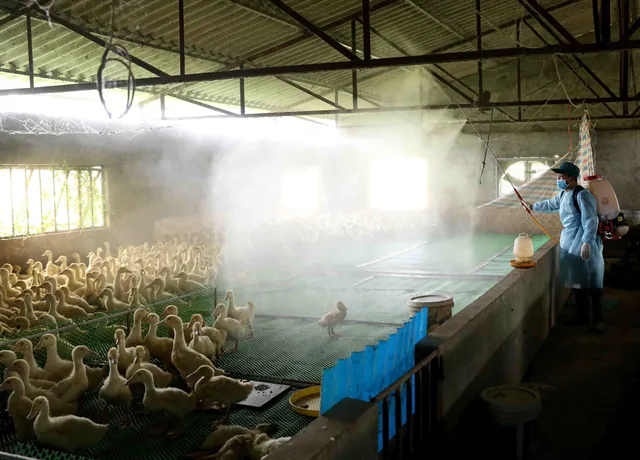Vietnam closely monitors passengers from H5N1-stricken areas
Vietnam keeps an eye on severe pneumonia cases in medical facilities and transport of poultry.
The Vietnamese Ministry of Health has asked local authorities to strictly monitor the entry of passengers from areas with H5N1 avian influenza outbreaks, as two cases have been reported this week in a province bordering Cambodia, one of whom has died.
The ministry acknowledged that H5N1 and other bird flu viruses can be imported into Vietnam through illegal poultry transport. "As trade activities between Vietnam and other countries expand, the risk of importing bird flu is high," it stressed.
The ministry warned that Vietnam's current weather conditions are ideal breeding grounds for bird flu viruses, and many festivals held after the Lunar New Year mean that the transport and sale of poultry may increase, leading to higher risks of infection.
Veterinary staff disinfects a poultry farm in Hanoi’s outlying district of Chuong My District. Photo: Vu Sinh |
It also required local health departments to monitor severe pneumonia cases at medical centers, especially those returning from areas with outbreaks, and to collect samples to ascertain the cause of the illnesses.
The ministry also sent dispatches to leaders of localities, especially border cities and provinces, to strengthen bird flu prevention and control in the context of the increasing opening of trade between Vietnam and other countries.
All localities should closely monitor the entry of people from areas with avian influenza outbreaks, monitor poultry entering Vietnam across the border, and detect early outbreaks of influenza in the poultry population as well as cases of pneumonia of unknown origin in the human population.
For people with symptoms such as high fever, muscle pain, headache, cough or difficulty breathing, authorities should investigate and detect suspected cases of infection for quarantine and testing to prevent the disease from spreading to the community.
Hospitals need to be ready to isolate and treat infected patients and promptly notify the Centers for Disease Control for timely epidemic prevention and control measures. They must ensure enough medicines, medical supplies, and chemicals to handle the outbreaks.
Vietnam recorded its first human case of A/H5N1 avian influenza in eight years in October 2022, a five-year-old girl in the northern province of Phu Tho. The girl, who had eaten meat from sick chickens and ducks a week before she became ill, recovered after treatment.
Since the first bird flu outbreak in 2003, the total number of A/H5N1 avian flu patients in Vietnam has reached 128, and half of them have died.
Earlier, the World Health Organization (WHO) on February 24 called for all countries to be vigilant amid rising number of avian flu cases in humans. The WHO expressed concern about possible human-to-human transmission after a Cambodian man tested positive shortly after his 11-year-old Cambodian daughter died from the disease.
A new strain of H5N1, clade 2.3.4.4b, emerged in 2020 and has been causing record numbers of deaths among wild birds and domestic poultry in recent months, and has also infected mammals, WHO said.











